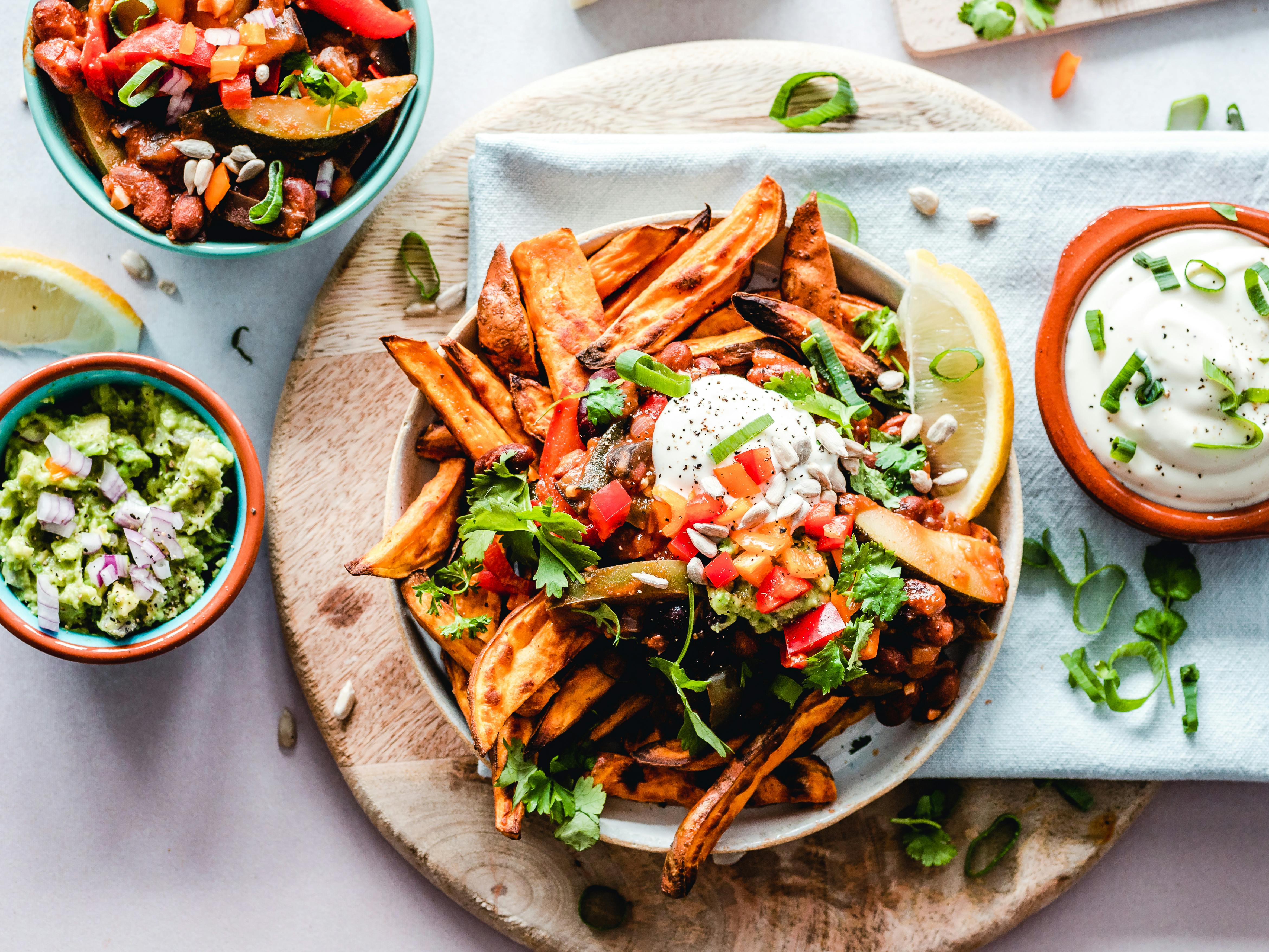
Table of Contents
Healthy Eating Habits for a Healthy and Happy Life

You know how important it is to take care of your body and mind, and one essential aspect of that is developing healthy eating habits. It’s not about restrictive diets or depriving yourself of your favorite foods, but rather making smart choices that nourish your body and mind. In this article, we will uncover five simple yet effective tips to help you develop healthy eating habits that will leave you feeling energized and satisfied.
So get ready to embark on a new journey towards improved well-being and discover the power of food in nourishing your body and mind.

Tip 1: Understand the importance of healthy eating
Recognizing the impact of food choices on overall health
When it comes to healthy eating, it’s important to understand just how much your food choices can impact your overall health. The food we consume plays a significant role in not only our physical well-being but also our mental health. By making mindful and nutritious food choices, you can fuel your body with the essential nutrients it needs to function at its best.
Understanding the benefits of a balanced diet
A balanced diet is key to maintaining good health. It involves consuming a variety of foods from different food groups, including fruits, vegetables, whole grains, lean proteins, and healthy fats. Each food group provides a unique set of nutrients that your body needs. By including all of these food groups in your diet, you ensure that you’re getting a wide range of vitamins, minerals, and antioxidants, which can contribute to better overall health and well-being. It’s part of a living well plan.
Exploring the connection between diet and mental well-being
Did you know that what you eat can affect your mental well-being too? The food we consume doesn’t just provide physical nourishment; it also affects our mood, energy levels, and cognitive function. Studies have shown that a diet rich in fruits, vegetables, whole grains, and lean proteins can improve mental health outcomes, such as reducing the risk of depression and anxiety. So, choosing a healthy diet isn’t just about physical health; it also has significant benefits for your mental well-being.
Tip 2: Plan your meals in advance
Creating a weekly meal plan
One of the best ways to ensure you’re making healthy choices is by planning your meals in advance. By creating a weekly meal plan, you can take the guesswork out of what to eat each day and ensure that you have the necessary ingredients on hand. Start by deciding on your main meals for the week, including breakfast, lunch, and dinner. Then, make a shopping list and stock up on all the nutritious foods you’ll need to prepare your meals.
Including a variety of nutrient-dense foods
When planning your meals, it’s important to include a variety of nutrient-dense foods. Nutrient-dense foods are those that contain a high concentration of vitamins, minerals, and other beneficial compounds with relatively few calories. These foods include fruits, vegetables, whole grains, lean proteins, and healthy fats. By incorporating a wide range of these foods into your meal plan, you can ensure that you’re getting all the essential nutrients your body needs to thrive.
Prepping meals and snacks for busy days
Life can get busy, and it’s easy to reach for unhealthy convenience foods when you’re short on time. That’s why meal prepping is a great strategy for staying on track with your healthy eating goals. Spend some time on the weekends or a designated day during the week prepping meals and snacks for the upcoming days. This could involve chopping vegetables, cooking proteins, and portioning out meals into containers. By having ready-to-eat healthy options on hand, you’ll be less likely to resort to unhealthy choices when you’re pressed for time.
Manage portion size is a top healthy eating habit
While choosing healthy foods is important, it’s also crucial to pay attention to portion sizes. Even nutritious foods can contribute to weight gain if consumed in excessive amounts. To manage portion sizes effectively, you can use tools like measuring cups, kitchen scales, or visual references. It’s also helpful to listen to your body’s hunger and fullness cues, as it knows best when it comes to how much food you need. By being mindful of portion sizes, you can ensure that you’re fueling your body adequately without overdoing it.
Tip 3: Make mindful food choices
Listening to your body’s hunger and fullness cues
One of the most fundamental aspects of healthy eating is listening to your body’s hunger and fullness cues. It’s important to eat when you’re genuinely hungry and stop eating when you’re comfortably full. Mindful eating involves paying attention to the sensations in your body and being aware of your eating habits. By practicing mindful eating, you can better understand your body’s needs and make choices that align with what your body truly needs.
Make a habit of eating whole unprocessed foods
When it comes to making healthy food choices, opt for whole, unprocessed foods whenever possible. Whole foods are those that have undergone minimal processing and are as close to their natural state as possible. These foods are typically rich in nutrients and have fewer additives compared to processed foods. Incorporating whole foods like fruits, vegetables, legumes, whole grains, and lean proteins into your diet can provide your body with the essential vitamins, minerals, and fiber it needs to thrive.
Opting for lean proteins
Protein is an essential nutrient that plays a crucial role in maintaining and repairing tissues, supporting immune function, and providing energy. When selecting protein sources, opt for lean options such as poultry, fish, tofu, beans, and legumes. These sources of protein are lower in saturated fats and can contribute to a well-rounded, healthy diet. Including a variety of lean proteins in your meals can help satisfy your hunger, support muscle health, and promote overall well-being.
Incorporating a colorful array of fruits and vegetables
Fruits and vegetables are a vital part of a healthy diet as they provide essential vitamins, minerals, and antioxidants. Aim to incorporate a colorful array of fruits and vegetables into your meals and snacks. Each color of fruits and vegetables represents different antioxidants and phytochemicals, so by having a diverse range of colors, you’re ensuring that you’re getting a wide variety of beneficial compounds. From leafy greens to vibrant berries, the more colors on your plate, the better.
Limiting added sugars and unhealthy fats
While some fats and sugars are necessary for a healthy diet, it’s important to limit your intake of added sugars and unhealthy fats. Added sugars, such as those found in sugary beverages and processed snacks, can contribute to weight gain and increase the risk of chronic diseases. Unhealthy fats, such as saturated fats and trans fats, can negatively impact heart health. Instead, focus on consuming natural sugars from whole fruits and incorporating healthy fats from sources like avocados, nuts, and olive oil in moderation.
Reading food labels and understanding ingredients
Reading food labels is an essential skill for making informed and healthy choices. Take the time to read and understand the ingredients and nutritional information on the labels of packaged foods. Look out for hidden sources of added sugars, high levels of sodium, or unhealthy fats. By becoming familiar with food labels, you can make conscious decisions about what foods to include in your diet.
Tip 4: Cultivate a positive eating environment
Creating a calm and pleasant atmosphere during meals
The environment in which you eat can have a significant impact on your eating habits. Create a calm and pleasant atmosphere during meals by sitting down at a table, using proper dinnerware, and minimizing distractions. Set the table, dim the lights if possible, and create an ambiance that encourages relaxation and enjoyment. By making meals a pleasant experience, you’re more likely to eat mindfully and savor your food.
Avoiding distractions like electronic devices
In today’s digital age, it’s easy to get caught up in electronic devices during mealtimes. However, distractions like smartphones, tablets, or television can detract from the mindful eating experience. Set aside dedicated meal times where electronic devices are off-limits. Instead, focus on the flavors, textures, and smells of your food. By eliminating distractions, you can fully engage with your meals and develop a healthier relationship with food.
Practicing mindful and healthy eating habits
Mindful eating is a practice that involves paying full attention to the act of eating. It involves savoring each bite, being aware of the flavors and textures, and being present in the moment. Practicing mindful eating can help you develop a deeper connection with your food and your body’s hunger and fullness cues. Take the time to chew your food thoroughly, savor the flavors, and truly enjoy each meal.
Eating together as a family or with friends
Eating together as a family or with friends can significantly enhance the eating experience. Not only does it provide an opportunity to connect and socialize, but it can also promote healthier eating habits. Research has shown that individuals who eat together tend to consume a wider variety of foods, eat more fruits and vegetables, and have a lower risk of developing disordered eating patterns. So, make it a priority to sit down and enjoy meals with loved ones whenever possible.

Tip 5: Stay consistent and flexible
Establishing regular meal times
Establishing regular meal times can help create a sense of consistency in your eating habits. Aim to eat meals at approximately the same time each day, as this can help regulate hunger and prevent excessive snacking. By sticking to a regular eating schedule, you’re less likely to skip meals or make impulsive food choices.
Avoiding strict diets or extreme restrictions
While it’s important to make healthy food choices, it’s equally important to avoid strict diets or extreme restrictions. Sustainable and long-term healthy eating habits are built on balance and moderation. Restrictive diets can often lead to feelings of deprivation, which can eventually lead to binge-eating or unhealthy relationships with food. Instead, focus on nourishing your body with wholesome foods while allowing yourself occasional indulgences in moderation.
Allowing occasional indulgences
It’s okay to indulge in your favorite treats once in a while. Denying yourself the foods you love entirely can be unsustainable and may lead to feelings of guilt or food cravings. Allow yourself occasional indulgences, whether it’s a slice of cake on a special occasion or a small serving of your favorite dessert. By incorporating treats into your diet in moderation, you can maintain a healthy relationship with food without feeling deprived.
Being adaptable to different situations
Life is unpredictable, and there will be times when your eating habits may need to be adaptable. Whether you’re traveling, attending social events, or facing unexpected circumstances, it’s important to be flexible with your food choices. Focus on making the best choices available to you in each situation without feeling overly restrictive or stressed. Being adaptable allows you to maintain a healthy balance and prevents feelings of guilt or anxiety about deviating from your routine.
Conclusion Tips for Healthy Eating
Developing healthy eating habits is a journey that requires understanding the importance of nutrition, planning your meals and making mindful food choices, But take time to cultivate a positive eating environment, and you’ll reap the benefits of a happier life as you enjoy your health. So start today by incorporating these tips and watch as your health and happiness flourish.



